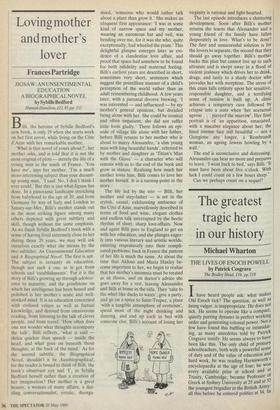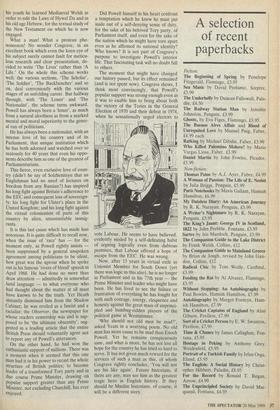The greatest tragic hero in our history
Michael Wharton
THE LIVES OF ENOCH POWELL by Patrick Cosgrave
The Bodley Head, £16, pp.518
Ihave heard people ask: what makes Old Enoch tick? The question, as well as being vulgar, is inappropriate. He does not tick. He seems to operate like a compact, quietly purring dynamo in perfect working order and generating colossal power. Not a few have found this baffling or intimidat- ing, as many anecdotes told by Patrick Cosgrave testify. He seems always to have been like this. The only child of primary schoolteachers, both with a powerful sense of duty and of the value of education and hard work, he was reading Harmsworth s encyclopaedia at the age of four; he won -every available prize at school and at Trinity, Cambridge; became Professor of Greek at Sydney University at 25 and at 32 the youngest brigadier in the British Army all this before he entered politics at 34. In his youth he learned Mediaeval Welsh in order to edit the Laws of Hywel Da and in his old age Hebrew, for the textual study of the New Testament on which he is now engaged.
What a man! What a protean phe- nomenon! No wonder Cosgrave, in an excellent book which even the keen eye of his subject surely cannot fault for meticu- lous research and clear presentation, de- cided to write 'The Lives' rather than 'A Life.' On the whole this scheme works well: the various sections, 'The Scholar', `The Soldier', 'The Backbencher' and so on, deal conveniently with the various stages of an unfolding career. But halfway through, with 'The Loner' and 'The Nationalist', the scheme turns awkward. Powell has always been a 'loner', as much from a natural aloofness as from a marked mental and moral superiority to the gener- al run of politicians. He has always been a nationalist, with an intense love of his country and of its Parliament, that unique institution which he has both adorned and watched over so zealously for 40 years that even his oppo- nents describe him as one of the greatest of Parliamentarians.
This fierce, even exclusive love of coun- try (didn't he say of Solzhenitsyn that an Englishman had no need of lectures on freedom from any Russian?) has inspired his long fight against Britain's adherence to the EEC and consequent loss of sovereign- ty; his long fight for Ulster's place in the United Kingdom; and his long fight against the virtual colonisation of parts of this country by alien, unassimilable immig- rants.
It is this last cause which has made him notorious. It is quite difficult to recall now, when the issue of 'race' has — for the moment only, as Powell rightly insists been suppressed by a general unspoken agreement among politicians to be silent, how great was the uproar when he spoke out in his famous 'rivers of blood' speech in April 1968. He had done no more than draw attention — admittedly in somewhat lurid language — to what everyone who had thought about the matter at all must have known to be the truth. Yet Heath Instantly dismissed him from the Shadow Cabinet; he was reviled as a fascist and a racialist; the Observer, the newspaper for whose readers censorship was and is sup- posed to be 'the ultimate obscenity', sug- gested in a leading article that the entire British Press should voluntarily agree not to report any of Powell's utterances. On the other hand, he had won the enthusiastic support of millions. There was a moment when it seemed that this one man had it in his power to recast the whole structure of British politics; to become leader of a transformed Tory party and in due course Prime Minister, drawing. on Popular support greater than any Prime Minister, not excluding Churchill, has ever enjoyed. Did Powell himself in his heart confront a temptation which he knew he must put aside out of a self-denying sense of duty, for the sake of his beloved Tory party, of Parliament itself, and even for the sake of the nation which he might have torn apart even as he affirmed its national identity? Who knows? It is not part of Cosgrave's purpose to investigate Powell's interior life. That fascinating task will no doubt fall to others.
The moment that might have changed our history passed, but its effect remained (and is not spent now). Cosgrave shows, I think most convincingly, that Powell's popular support was strong enough even as it was to enable him to bring about both the victory of the Tories in the General Election of 1970 and their defeat in 1974, when he sensationally urged electors to vote Labour. He seems to have believed, evidently misled by a self-defeating habit of arguing logically even from dubious premises, that Labour offered a hope of escape from the EEC. He was wrong. Now, after 13 years in virtual exile as Unionist Member for South Down (yet there was logic in this also), he is no longer in Parliament and in his 77th year — the Prime Minister and leader who might have been. He has lived to see the failure or frustration of everything he has fought for with such courage, energy, eloquence and honesty against the great mass of unprinci- pled and humbug-ridden players of the political game at Westminster.
'Why should not old men be mad?', asked Yeats in a worrying poem. No old man has more cause to be mad than Enoch Powell. Yet he remains conspicuously sane, and what is more, he has not lost all hope for the country he has tried so hard to serve. It has not given much reward for the services of such a man as this, of whom Cosgrave rightly concludes, 'You will not see his like again'. Future historians, if there are any, may see him as the greatest tragic hero in English history. If they should be Muslim historians, of course, it will be a different story.



































































 Previous page
Previous page